Abstract
The concept of wisdom is a crucial aspect of all religious education and is a dynamic factor in human relationships. In general, wisdom is a worldview by which a person can live in this world in a balanced way. The chapter affirms the place of wisdom in the religious realm and inter-religious education. Various definitions of wisdom are offered, and focus is given to world wisdom literature and the religious traditions started by the prophets and founders of religions.
Access this chapter
Tax calculation will be finalised at checkout
Purchases are for personal use only
Notes
- 1.
According to Heracleides Ponticus, a disciple of Plato, Pythagoras was once asked; “What are you?” and he replied, “I am a philosopher (philosophos)” since he believed that only God knows everything and He is wise but humans are not able to be wise. Therefore, for him, humans should be “lovers of wisdom” (Eliade, 1987, Vol. 15, pp. 5, 6, 216).
- 2.
Indian Philosopher, born in Bihar. He is the founder of Nyaya school of India, a classical system which was primarily concerned with methodology and reason and developed a system of logic (see Goring, 1994).
- 3.
The liberal development within Buddhist practice in the first century A.D. in China, Tibet, Mongolia, Nepal, Korea, and Japan. In Mahayana Buddhism the prime emotion is compassion and is ranked equal to wisdom as a means of achieving enlightenment.
- 4.
It is the most important and best known religion of pre-Islamic Iran. It takes its name from its founder Zarathhustra (Zoroaster) who probably lived around the beginning of the first millennium B.C. Although some claim that Mazdaism was a different religion, in fact Zoroastrianism and Mazdaism are synonymous. Ahura Mazda (wise lord) is the only name for the Zoroastrian God (see Eliade, 1987).
- 5.
Normative custom of the prophet Muhammad by which he clarified the application of revealed commands as a second important source of Islam after the Qurân.
References
Ackrill, J. L. (Ed.). (1989). Aristotle, Nicomachean ethics. A new Aristotle reader. New Jersey: Princeton University Press.
Blanchard, B. (1967). Wisdom. In P. Edwards (Ed.), The Encyclopaedia of philosophy (Vol. 8, p. 322). London: The Macmillan Company and the Free Press.
Blenkinsop, J. (1995). Wisdom and law in the old testament (Rev. ed.). Oxford: University Press.
Clements, E. R. (1992). Wisdom in theology. Carlisle: The Paternoster Press.
Cohn-Sherbok, D. (1992). The Blackwell Dictionary of Judaica. Oxford: Blackwell.
Collins Softback English Dictionary. (1992). Glasgow: Harper Collins.
Dunn, T. (2005). Living Wisdom. Retrieved December 16, 2008, from http://www.poetrybytroy.com/Living_Wisdom.pdf
Eliade, M. (Ed.). (1987). The Encyclopaedia of religion. New York: Macmillan.
Foster, F. C. (1943). More wisdom. The Journal of Higher Education, 14(9), 438–486.
Foster, R. V. (1885, November). The Hebrew wisdom. The Old Testament Student, 5(3), 104–105.
Gaskell, G. A. (1923). A dictionary of the sacred language of all scriptures and myths. London: Allen and Unwin.
Gordon, A. R. (1921). Wisdom. In J. Hostings (Ed.), Encyclopaedia of religion and ethics (Vol. 12, p. 742). Edinburgh: T & T Clark.
Goring, R. (1994). Dictionary of beliefs and religion. Edinburgh: Larousse.
Irwin, W. A. (1961). Where shall wisdom be found? Journal of Biblical Literature, 80(2), 142.
Leon-Dufour, X. (Ed.). (1967). Dictionary of biblical theology. London: Geoffrey Chapman
Macdonald, C. (2006, April 5). Wisdom: The highest aim of life and higher education. Paper presented at Rollins College, Winter Park, Florida. Retrieved December 16, 2008, from www.wisdompage/rollinstalk.html
Macquarrie, J. (Ed.). (1967). A dictionary of Christian ethics. London: SCM Press Ltd.
Maxwell, N. (2004a). Is science neurotic? London: Imperial College Press.
Maxwell, N. (2004b, October). In defence of seeking wisdom. Metaphilosophy, 35(5), 733.
McKenzie, J. L. (1965). Dictionary of the Bible. London: Geoffrey Chapman
McKenzie, J. L. (1967). Reflection on wisdom. Journal of Biblical Literature, 86(1), 2.
Meyendorff, J. (1987). Wisdom – sophia: Contrasting approaches to a complex theme. Dumbarton Oaks Papers, 41, 391.
Önal, M. (1998). The concept of wisdom and philosophy in Islam (Unpublished Ph. D. thesis). Lampeter: University of Wales.
Önal, M. (2007). Innovation in Islam. Studies in Interreligious Dialogue, 17(1), 61.
Polin, R. (1955). Against wisdom. Philosophy and Phenomenological Research, 16(1), 15.
Resse, W. L. (1980). Dictionary of philosophy and religion. London: Humanities Press.
Roth, C., & Wigoder, G. (Eds.). (1972). Encyclopaedia Judaica (Vol. 16, p. 558, 559). Jerusalem: Keter Publishing.
Rudolph, K. (1987). Wisdom. In E. Mercia (Ed.), The Encyclopaedia of religion. New York: Macmillan.
Ryan, S. (2008). Wisdom. In E. N. Zalta (Ed.), Stanford Encyclopedia of philosophy. Chicago: Stanford University Press.
Scott, R. B. Y. (1961). Wisdom and the knowledge of god. Journal of Biblical Literature, 80(1), 12.
Swidler, L. (1996). A Christian historical perspective on wisdom as a basis for dialogue with Judaism and Chinese religion. Journal of Ecumenical Studies, 33(4), 557, 559.
The Bible (Rev. Standard Version). (1952). New York: American Bible Society
The Holy Qurân (Eng. Trans.). (1994). Madina: The Presidency of Islamic Researches, IFTA, King Fahd Holy Quran, Printing Complex.
The Oxford English Dictionary. (1989). Oxford: Clarendon Press.
Tozlu, N., & Önal, M. (2003). The concept of wisdom in the Bible and Qurân. Studies in Interreligious Dialogue, 13(1), 106.
Ulken, H. Z. (1982). Türk Tefekkürü Tarihi (Turkish). İstanbul: YKY
Welton, D. M. (1897). The old Testament wisdom (Chokma). The Biblical World, 10(3), 183, 188.
Zaehner, R. C. (1971). The concise Encyclopaedia of living faiths (2nd ed.). London: Hutchinson Press.
Author information
Authors and Affiliations
Corresponding author
Editor information
Editors and Affiliations
Rights and permissions
Copyright information
© 2010 Springer Science+Business Media B.V.
About this chapter
Cite this chapter
Önal, M. (2010). Wisdom (Hikmah) as a Holistic Basis for Inter-religious Education. In: Engebretson, K., de Souza, M., Durka, G., Gearon, L. (eds) International Handbook of Inter-religious Education. International Handbooks of Religion and Education, vol 4. Springer, Dordrecht. https://doi.org/10.1007/978-1-4020-9260-2_14
Download citation
DOI: https://doi.org/10.1007/978-1-4020-9260-2_14
Published:
Publisher Name: Springer, Dordrecht
Print ISBN: 978-1-4020-9273-2
Online ISBN: 978-1-4020-9260-2
eBook Packages: Humanities, Social Sciences and LawEducation (R0)

